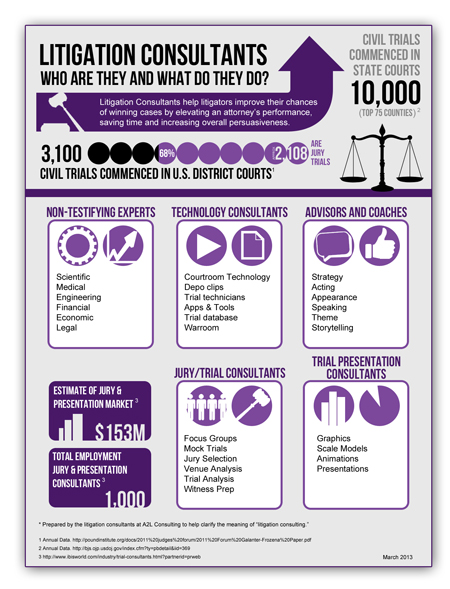by Ken Lopez
Founder & CEO
A2L Consulting
In February of this year, we released a draft infographic to help explain what a litigation consultant is and what a litigation consultant does. We solicited and received feedback from the many members of the legal industry. Today, we're proud to release this litigation consultant infographic [PDF] and to encourage others to use it to help explain what we litigation consultants actually do.
This exercise caused me to ask: What, in fact, do litigation consultants actually do? It also allowed me to reflect on the experience I had working with a colleague over the last year.
A year ago, a new litigation consultant joined our team and quickly observed, “All too often, we don't have a chance to actually consult. Why?” He had been a litigator at a major law firm who had actually hired A2L for a case where we went on to win more than $500 million in a jury verdict. So he had a good perspective, and we've spent the last year discussing how we would like the industry to develop over the next 10 years.
We've already made some general observations like:
1) Too many people call themselves “consultants” in our industry who do not actually consult (i.e. share their unique expertise) on anything.
2) Our firm is quite serious about adding noticeable and measurable value to each engagement.
3) Not all trial teams leave room for litigation consulting.
So, we've spent the last year adding some structure to trial preparation. For example, we've introduced two new mock exercises - the Mock Markman for patent litigators and the Micro-Mock™ for general litigation, arbitration and hearings. These add to our Mind-Mapping litigation strategy session.
Each of these exercises is designed to help the trial team be their best at trial. Each is designed to help enforce the idea that each opening statement must consist of a story with a well-developed theme that people care about. Each is designed to be consultative.
There are good litigation consultants out there, and, just as there are bad lawyers, there are also bad litigation consultants. The evidence that a bad one is involved includes a lack of preparation, a lack of meaningful experience, and an inability to add value.
Compare our team (and the teams of some other top litigation consulting firms) with lesser firms. Our client-facing people are litigators themselves -- some with more than a billion dollars of jury verdicts. By contrast, some other firms in the industry, I'm told, are of the order-taking variety, they have client-facing "consultants" who are really 20-something project managers and there are firms who offer strategy consulting former law firm technical support staff.
So, one takeaway of figuring out who a litigation consultant is and what he/she does is recognizing that there are different types. If you have a serious case, pick serious consultants. If you have a minor technical challenge and need documents displayed properly, find a firm that does simply that - whether they call themselves litigation consultants or not.
Download a PDF Version of the Litigation Consultants Infographic by clicking here.






Leave a Comment